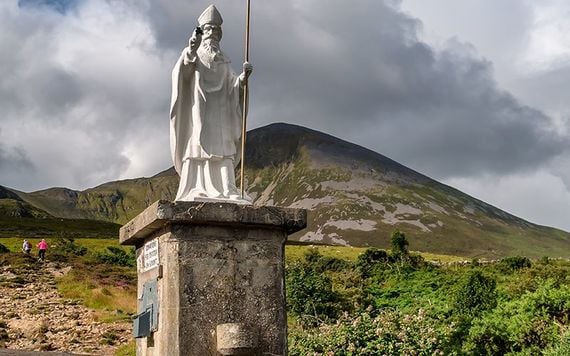We often forget, when partying on Saint Patrick's day, everything that he endured to bring the faith to Ireland. The Irish had such a reputation for fierceness and piracy that most missionaries were afraid to go there. Saint Patrick had suffered as a slave in Ireland (he would make a great patron of the enslaved) after being kidnapped from his home. That he would have the courage to return to the place of his degradation is amazingly heroic in itself. Once in Ireland as a missionary, Saint Patrick had many ordeals. The druids hated him and tried to kill him at least once; he was often hunted like an animal. In order to recollect himself and gain strength and grace for his apostolic endeavors, he would retreat to a mountain called "Croagh Patrick."
According to New Advent:
A mountain looking out on the Atlantic ocean from the southern shore of Clew Bay, in the County Mayo, and called "the Sinai of Ireland." In pagan times it was known as Cruachan Aigli. It rises in a perfect cone to a height of 2510 feet. The account given below is taken from sources that post-date the saint's death by three hundred years. There are, however, good reasons to believe that the traditions they embody are genuine, St. Patrick was careworn and fatigued when he came to this remote part of the country. He longed to retire for a while to refresh his soul in solitude, and for that purpose on the Saturday before Ash Wednesday in the year 441, he betook himself to the mountain top. Here he spent the days of Lent, chastising his body with fasts, pouring out his heart to God, and entreating Him with prolonged importunity and with tears that the Faith may not fail in the land of Erin. The "Book of Armagh" mentions that God summoned all the saints of Erin, past, present and future, to appear before their father in the Faith to comfort him with a vision of the teeming harvest his labours would produce, and to join him in blessing their kinsmen and their country.It is good to know that even the great saints had times when they had to fight discouragement. They rejuvenated themselves by being alone with God. Croagh Patrick is still a place of pilgrimage.
"An Irish immigrant builds a new life in Canada, the decades marked by marriage, children and the odd otherworldly encounter. Vidal (Madame Royale, 2010, etc.) successfully transforms family stories into a historical novel that chronicles the life of her great-great-great-grandfather, Daniel O'Connor, who established a homestead in Ontario in the 19th century. O'Connor, a blacksmith living in County Cork, Ireland, is frustrated in his desire to train as a doctor because of English laws restricting Catholics' religious freedom and economic chances. When the political activities of his wild younger brother Owen cast suspicion on O'Connor, he flees Ireland, carrying just two mementos of his homeland--a white rosebush uprooted by his mother and a "paradise tree," a wooden crucifix so called because it represents a ladder of suffering to climb to heaven. Nine years later he has carved Long Point farm out of the wilderness, creating a home despite the new continent's own anti-Catholic prejudice. He marries Brigit, a girl 18 years younger than he is, then almost loses her to Owen, who arrives at the farm after his own midnight departure from Eire. But when a vision of his mother appears to him, hands on hips, he finds the will to throw his brother out of the house and confront his bride. She sobs and swears she will die of shame, insisting, " 'Oh, yes, I will die. I will,' she choked. 'But fret not....I'll be getting over it.' " And she does, bearing 11 children. The novel follows them as they grow to adulthood, marry and have children of their own, with each section of the book told through the eyes of a different character. Though the story unwinds slowly, it never drags. An imaginative, meticulously told history that will especially appeal to those with Irish roots" ~from Kirkus Reviews



















2 comments:
I saw Croagh Patrick the last time I was in Ireland!
Thank you, Elena, for this thoughtful piece on one of my favorite saints.
Thanks, Alice, I would love to go there.
Post a Comment